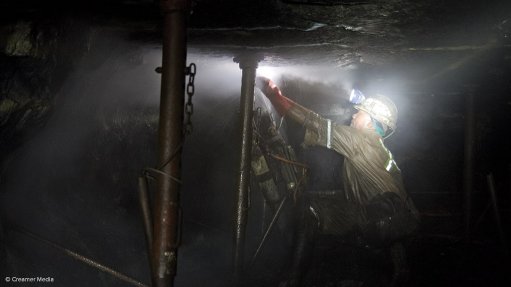
Photo by: Creamer Media
The Energy Intensive Users Group of Southern Africa (EIUG) is calling for urgent consideration to be given to the development of industrial tariffs for large power users, in the light of the threat being posed to domestic mining and industrial firms by steeply rising electricity tariffs.
In a statement released in response to the R21-billion loss posted by Eskom for 2019, the organisation said the utility’s financial performance was of “grave concern” and acknowledged that stabilising the State-owned company would require “trade-offs from all stakeholders”.
Nevertheless, it warned that ongoing above-inflation tariff increases were threatening the survival of large power users, some of which were “already beyond the tipping point”.
“Several companies have stopped production processes, that could be contributing to creating a significant number of new jobs, due to high electricity prices.”
The EIUG claimed that some 47 furnaces – representing potential power demand of about 1 200 MW and potential employment for some 12 400 people – were currently standing idle across the country,
“There is a case to be made, [therefore], for urgency on the development of industrial tariffs for large power users.”
The organisation insisted that such a tariff regime would not equate to a subsidy, but rather to the removal of cross-subsidies currently embedded in industrial tariffs that were increasing them above cost-reflective levels.
The EIUG estimates that these subsidies add up to about 20% of the total price paid by large power users, whose electricity costs account for some 10% to 50% of input costs.
“It is critical that Eskom retains and supports large power users that not only contribute significantly to Eskom’s revenue, but also support the South African economy and employment.”
The EIUG also responded to Eskom’s move to legally challenge recent tariff decisions made by the National Energy Regulator of South Africa, arguing that attention should instead be given to overhauling the “outdated” regulatory model.
“We urge the Department of Mineral Resources and Energy to urgently review the regulatory methodology to ensure that it is suitable and allows for an affordable tariff path.”
The EIUG proposed a fundamental change to the current regulatory model, whereby Eskom is “run for cash” and, thus, granted enough revenue to pay its operating costs and to service debt.
Separately, independent energy expert Mike Rossouw attributed the tariff problem to the country’s prevailing pricing policy, which he said was designed and administered before Eskom started building new plant.
“Government and the regulator recognised, in the early 1990s, that this policy had to change, but no one had the guts or appetite to change it at that time, or since,” he said, arguing that tariffs were spiralling out of control and threatening a “death spiral” at Eskom.
Eskom, Rossouw argued, did not have a revenue problem as was being claimed in its legal review of Nersa’s price determination for 2018/19, as well as the three Regulatory Clearing Account determinations for the 2014/15, 2015/16 and 2016/17 financial years.
Instead, its financial woes were caused by poor cost management, in particular the cost of coal, maintenance and wages.
“The solution is to change the current price policy so that it rewards Eskom for good management and penalises poor management. The design of this solution is simple, will not cost much and will be easy to implement with the support of government and the assistance of the regulator and Eskom,” Rossouw avers.